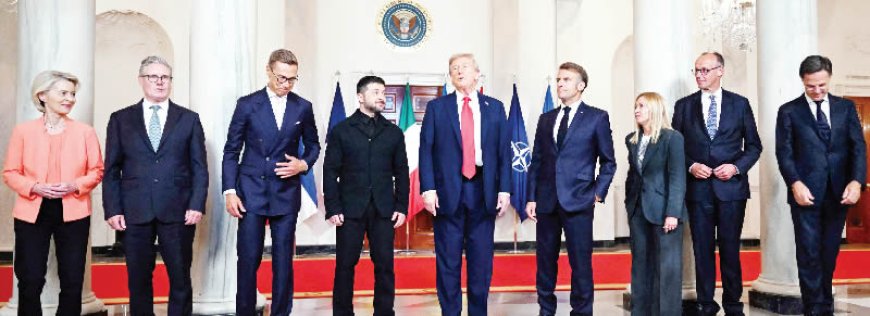Global leaders begin high-stakes talks to end Russia-Ukraine war

United States President Donald Trump, Ukrainian President Volodymyr Zelensky, and several top European leaders on Monday began high-stakes talks at the White House on ending the Russia-Ukraine war.
Security guarantees for Kyiv topped the agenda, with European leaders urging Trump to take a tough stance against Russian President Vladimir Putin to prevent future conflicts.
Before the closed-door session, the leaders expressed optimism about the prospects of a peace deal.
Trump said discussions would focus on “who will do what” as part of the security guarantees for Ukraine and signalled that a resolution could be reached the same day.
The US president also disclosed that “possible exchanges of territory” were on the table and announced plans to call Putin to arrange a trilateral meeting with him and Zelensky.
Trump told reporters inside the Oval Office that there was a “reasonable chance” of ending the war if such a meeting were to be held.
“I think if everything works out well today, we’ll have a trilateral, and I think there will be a reasonable chance of ending the war when we do that,” he said.
While reiterating his preference for a peace deal, Trump said he still supported the “concept” of a ceasefire.
“I like the concept of a ceasefire for one reason: because you’d stop killing people immediately, as opposed to in two weeks, or one week, or whatever it takes. We’re working on a peace deal, while they’re fighting, they have to fight. I wish they could stop. I’d like them to stop, but strategically, that could be a disadvantage for one side or the other,” he said.
The former US president added that a ceasefire might allow one side to rebuild militarily, a factor he acknowledged could complicate negotiations.
On his part, Zelensky said he had a “very good conversation” with Trump earlier in the day. He confirmed that they discussed “security guarantees and humanitarian concerns” and welcomed the possibility of a trilateral meeting with Putin.
“I think that we had a very good conversation with President Trump,” Zelensky said. “We spoke about very sensitive points.”
He thanked Trump and US First Lady Melania Trump for writing a letter to Putin on the plight of Ukraine’s abducted children.
Pressed on what security guarantees Ukraine needed, Zelensky replied, “everything,” stressing that his country required a strong army, weapons, people, training, and intelligence.
He added that such support would depend on “big countries” like the US and its allies.
The Ukrainian leader also expressed gratitude for a new NATO programme allowing member states to buy US weapons for Ukraine.
“We’re thankful for this program and this opportunity. We’re thankful for Europe – they pay for this,” he said, adding that American-made Patriots were crucial for Ukraine’s defence. “Nobody in Europe has so many air defence (systems like Patriots. We need it very much.”
Trump also praised the arrangement, noting that the US was not “giving anything” directly but selling equipment to allies backing Kyiv.
Meanwhile, European leaders voiced their positions on the peace push.
French President Emmanuel Macron insisted a European leader should be part of any meeting with Putin.
“When we speak about security guarantees, we speak about the whole security of the European continent,” he said.
NATO Secretary-General Mark Rutte described Trump’s readiness to support security guarantees for Ukraine as a “breakthrough” and thanked him for “breaking the deadlock” and pushing Putin to the table.
German Chancellor Friedrich Merz called for a ceasefire before further talks, while Finnish President Alexander Stubb hailed the White House talks as a turning point.
“In the past two weeks, we’ve probably had more progress in ending this war than we have in the past three and a half years,” Stubb said, noting his country’s 800-mile border and shared history with Russia.
British Prime Minister Keir Starmer added that Ukraine’s main European allies were “prepared to step up to the plate” to secure Kyiv’s future.

 admin
admin 


